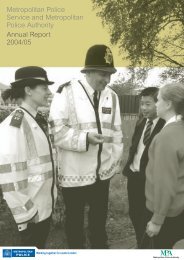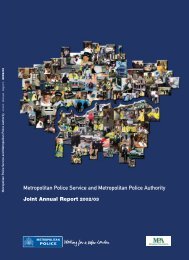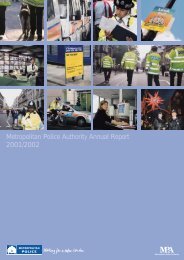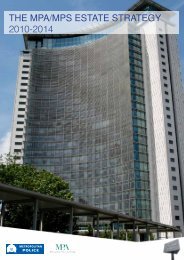Final Report of the Morris Inquiry: The Case for Change
Final Report of the Morris Inquiry: The Case for Change
Final Report of the Morris Inquiry: The Case for Change
You also want an ePaper? Increase the reach of your titles
YUMPU automatically turns print PDFs into web optimized ePapers that Google loves.
THE CASE FOR CHANGE<br />
<strong>The</strong> right systems<br />
8.29 <strong>The</strong> right structure must be supported by <strong>the</strong> right systems. <strong>The</strong> framework<br />
in which <strong>of</strong>ficers and staff have to operate must be clear and easy to understand.<br />
It will include transparent accountability arrangements with decisions taken at <strong>the</strong><br />
appropriate level. Our focus is people management and devolution has a vital part<br />
to play in providing a structure <strong>for</strong> local managers to manage <strong>the</strong> <strong>of</strong>ficers and staff<br />
<strong>for</strong> whom <strong>the</strong>y are responsible.<br />
8.30 Devolution, if implemented properly, encourages initiative and innovation.<br />
Effective communication systems, both vertical and horizontal, <strong>for</strong>mal and in<strong>for</strong>mal,<br />
are also essential. So too are <strong>for</strong>mal procedures <strong>for</strong> disciplinary, grievance and<br />
disputes, promoting equality and ensuring a work environment free <strong>of</strong> discrimination<br />
and harassment. We have already dealt with <strong>the</strong> MPS’ policies and procedures on<br />
diversity and discipline and o<strong>the</strong>r employment matters and do not intend saying<br />
more here.<br />
This section will <strong>the</strong>re<strong>for</strong>e concentrate on devolution and communication.<br />
Devolution<br />
8.31 Our recommendations <strong>for</strong> enhancing <strong>the</strong> <strong>of</strong>fice <strong>of</strong> constable are aimed at<br />
streamlining and modernising <strong>the</strong> discipline process and allowing managers to<br />
manage. We think that enabling managers to deal with <strong>the</strong> majority <strong>of</strong> discipline<br />
matters on a local level will provide greater flexibility and resolve issues more<br />
quickly.<br />
8.32 To make this process work, however, managers need to have greater<br />
experience and confidence in dealing with strategic managerial issues.<br />
8.33 <strong>The</strong>re are various ways in which managers can be supported. One important<br />
aspect <strong>of</strong> that support, however, is devolution <strong>of</strong> power and functions from <strong>the</strong><br />
centre <strong>of</strong> <strong>the</strong> MPS to <strong>the</strong> OCUs.<br />
8.34 This is a process which is already under way, having started with devolution <strong>of</strong><br />
personnel functions:<br />
“In 1995, <strong>the</strong> recommendations <strong>of</strong> <strong>the</strong> Personnel <strong>The</strong>me paper devolved responsibility and<br />
decision making from Personnel Department to local managers, in a range <strong>of</strong> personnel<br />
management activities.This devolution was supported by <strong>the</strong> introduction <strong>of</strong> pr<strong>of</strong>essionally<br />
qualified Personnel Managers at Operational Command Unit (OCU) level and by a structure<br />
led by Business Managers on each <strong>of</strong> <strong>the</strong> five MPS Areas.”<br />
(Submission from Assistant Commissioner Bernard Hogan-Howe.)<br />
184


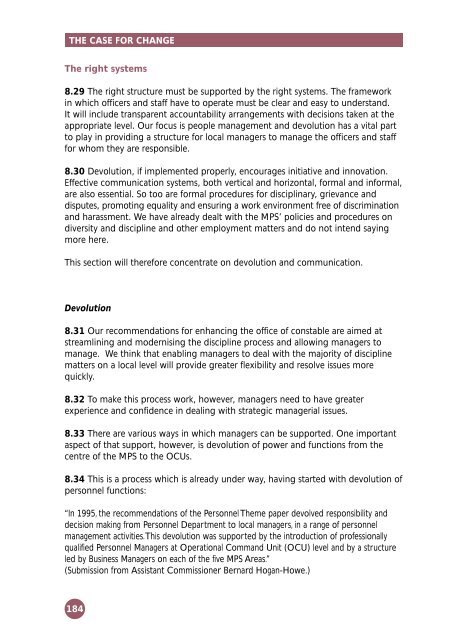
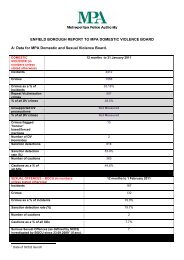
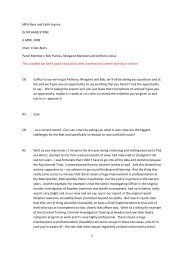
![Appendix 1 [PDF]](https://img.yumpu.com/51078997/1/184x260/appendix-1-pdf.jpg?quality=85)

![Transcript of this meeting [PDF]](https://img.yumpu.com/50087310/1/184x260/transcript-of-this-meeting-pdf.jpg?quality=85)
![Street drinking in Hounslow [PDF]](https://img.yumpu.com/49411456/1/184x260/street-drinking-in-hounslow-pdf.jpg?quality=85)
